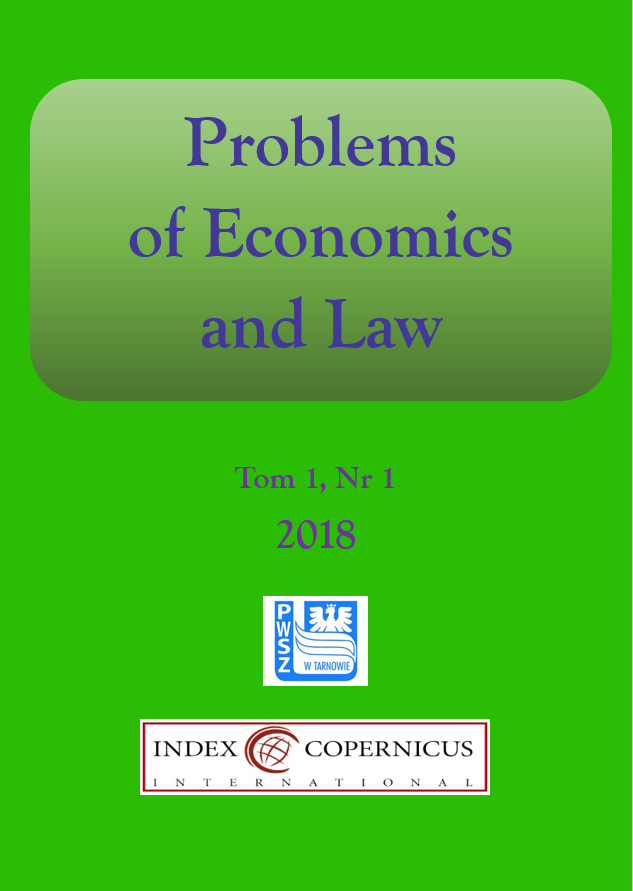The relation of social order to economic order in the concept of sustainable development
DOI:
https://doi.org/10.5604/01.3001.0012.8257Keywords:
economic governance, social governance, sustainable development, synthetic measureAbstract
Aim of the study: The answer to the question whether and how variables describing the so-cial order affect - expressed in a synthetic measure - economic order.
Material and methods: One of the important areas of scientific research on sustainable de-velopment includes factors affecting this development. As the nature of sustainable develop-ment is complex, it is necessary to examine various issues related to this development within four domains: environmental, economic, social and institutional-political. Mutual interactions between these governances are particularly interesting. Data for the analysis were obtained from the website of Eurostat. Variables were assigned to individual domains and divided into stimulants, nominants and destimulants based on the description of the variables provided by Eurostat. These data were used to determine the synthetic measure of economic governance and to select those groups of variables describing social governance that most completely de-scribe economic governance. Hellwig’s taxonomic measure was used to achieve this goal.
Results: Total values for groups of variables relating to economic governance and total values for groups of variables relating to social governance were determined for 28 selected Europe-an countries based on observation conducted over successive ten years. These results were then subjected to the procedure of panel data modelling. A fixed effects model was then se-lected as the most appropriate model.
Conclusions: The econometric model determined in the study describes economic govern-ance based on four groups of variables selected from among seven groups characterizing so-cial governance. The group of characteristics related to poverty and living conditions had the strongest positive impact on the direction of economic governance in the analysed period. The group of variables relating to consumption patterns and public health also had favourable ef-fects on the synthetic measure of economic governance. Two groups of variables: ‘demo-graphic changes’ and ‘public security’ had a negative impact on economic governance.
Downloads
References
ADAMS, C., RODRIGUES, S. T., CALMON, M. & KUMAR, C. 2016. Impacts of largescale forest restoration on socioeconomic status and local livelihoods: what we know and do not know. Biotropica, 48, 731-744. Google Scholar
AKAIKE, H. 1973. Information theory and an extension of the maximum likelihood principle. In: PETROV, B. N. & CSAKI, F. (eds.) Second International Symposium on Information Theory. Budapeszt: Akademiai Kiado. Google Scholar
BAUMGARTNER, R. J. & RAUTER, R. 2017. Strategic perspectives of corporate sustainability management to develop a sustainable organization. Journal of Cleaner Production, 140, 81-92. Google Scholar
CZYŻEWSKI, B., POLCYN, J. 2016. Education Quality and its Drivers in Rural Areas of Poland. Eastern European Countryside, 22, 197-227. Google Scholar
GARGALO, C. L., CARVALHO, A., GERNAEY, K. V. & SIN, G. 2016. A framework for techno-economic & environmental sustainability analysis by risk assessment for conceptual process evaluation. Biochemical Engineering Journal, 116, 146-156. Google Scholar
HANNAN, E. J. & QUINN, B. G. 1979. The Determination of the Order of an Autoregression. Journal of the Royal Statistical Society, B 41, 190–195. Google Scholar
HAUSMAN, J. A. 1978. Specification Tests in Econometrics. Econometrica, 46, 1251-1271. Google Scholar
HAUSMAN, J. A. & TAYLOR, W. E. 1981. Panel Data and Unobservable Individual Effects. Econometrica, 49, 1377-1398. Google Scholar
HNATYSZYN-DZIKOWSKA, A. 2009. Znaczenie zdrowia społeczeństwa dla wzrostu gospodarczego - ujęcie modelowe. In: CZECH-ROGOSZ, J. (ed.) Koniunktura gospodarcza a reakcje podmiotów gospodarujących. Katowice: Wydawnictwo Akademii Ekonomicznej w Katowicach. Google Scholar
HORST, L. V. M. & FREITAS, C. C. G. 2016. Sustainable development and social innovation: recycling from the perspective of social technology. Revista Tecnologia E Sociedade, 12, 20-41. Google Scholar
KLIMOVA, A., RONDEAU, E., ANDERSSON, K., PORRAS, J., RYBIN, A. & ZASLAYSKY, A. 2016. An international Master's program in green ICT as a contribution to sustainable development. Journal of Cleaner Production, 135, 223-239. Google Scholar
KOFF, H., MAGANDA, C. 2016. Environmental Security in Transnational Contexts: What Relevance for Regional Human Security Regimes? Globalizations, 13, 653-663. Google Scholar
SCHWARZ, G. 1978. Estimating the Dimension of a Model. Annals of Statistics, 6, 461-464. Google Scholar
TURCZAK, A. 2014. Perspektywy rozwoju rolnictwa ekologicznego w Polsce. Zeszyty Naukowe FIRMA i RYNEK, 46, 59-72. Google Scholar
TURCZAK, A., ZWIECH, P. 2016. Porównanie województw w Polsce na podstawie rozkładu dochodu rozporządzalnego per capita. Optimum Studia Ekonomiczne, 3, 131-147. Google Scholar
Downloads
Published
How to Cite
Issue
Section
License
Copyright (c) 2018 State Higher Vocational School in Tarnow, Poland & Authors

This work is licensed under a Creative Commons Attribution-ShareAlike 4.0 International License.





